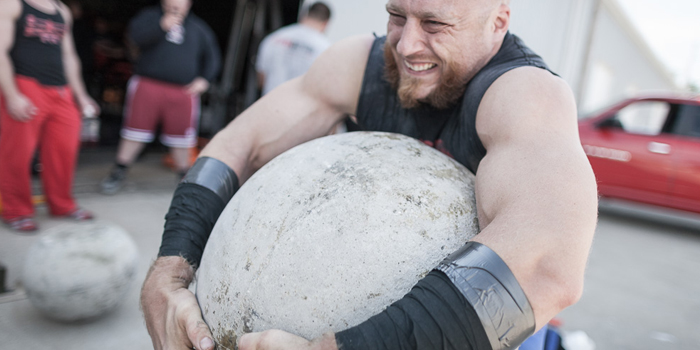
At any given time, there are only about 12 to 15 active middleweight (105 kilograms/231 pounds) pros in the country. By active, I mean still training for and competing in strongman. There are a few more active heavyweight pros, probably in the neighborhood of 20 to 25. There are fewer female pros, since the advent of the official strongwoman pro card only just became a reality within the last year or so. Despite the fact that there are fewer women at present and that female pros haven’t been around long enough to track demographics, career length, etc., the info presented here should be common to all pros, both men and women.
RELATED: Training the Atlas Stones
So what happens to an athlete when they become a professional at being really strong? After earning pro status, some guys retire from strongman within only a year or two, either due to injury, career, family, inability to compete at a higher level, or other life changes. Some middleweight pros decide that making the weight cut down to 231 pounds is not worth it and work toward earning their heavyweight pro card or compete in open pro shows. Some quit strongman and switch to other strength sports like powerlifting, weightlifting, Highland games, bodybuilding, or CrossFit (not to be confused with those who actively compete in multiple strength sports). Some unfortunately earn their pro card and then immediately quit strongman, either because they slipped through the cracks at a pro qualifier and aren’t really pro caliber athletes (this has only rarely happened) or because they wanted their pro card for marketing purposes to further their brand, company, business, social media persona, etc., rather than to move up to the highest level of the sport and continue their strength sport career. Whatever the athletes do once they win their pro card, though, all of them were good enough to be considered pro caliber at least once in their strongman or strongwoman careers, which means they were among the ranks of the handful of athletes in the country who can legitimately call themselves professionals, regardless of however briefly.
What follows is a list of some of the various and sundry factors that help contribute to winning a strongman or strongwoman pro card. The list is not comprehensive since you could (and I have) quickly come up with a dozen more examples. An athlete need not have nor be all of these things to become a pro, but after over a decade in the sport of strongman (including 42 competitions with 32 podium finishes spanning multiple weight classes and divisions, from novice to amateur lightweight, middleweight, middleweight pro, and open pro, eight years of which and counting have been as an active middleweight pro sponsored by elitefts), I have a pretty good idea of what it takes to reach the top echelon of the sport.
Without further preamble, and in no particular order, here are the things you need to do to reach pro status.
Get Good at Strongman/Strongwoman
There is a difference between being strong and being good at strongman or strongwoman. You can be strong as hell in general, strong in three lifts like a powerlifter, or strong in one specific lift like overhead press or deadlift, but then also suck donkey dong when it comes to picking things up and moving them, having to go fast, or doing more than one rep on an event. Strongman competitions can involve any combination of max strength, max power, strength endurance, power endurance, speed, and pain tolerance, depending on what the events are and how they are run. So being a one-dimensional athlete who is really fast but relatively weak, or who is strong like bull but slow as turds, will limit how good you will be at strongman. This may seem like common sense, but I’ve seen a whole bunch of guys and girls with one or more glaring weaknesses that persist for years without improvement. Subsequently, these people also do not win pro cards.
Be a Gear Whore
You may think that training and competing without a belt is better for developing your core strength and “hawt abz", that deadlift suits and straps are cheating and you aren’t really lifting the weight, or that spending hundreds of dollars on knee sleeves, elbow sleeves, wrist wraps, swamp shorts, weight lifting shoes, climbing shoes, cleats, grip shirts, stone sleeves, tacky, tape, a mouth guard, gloves, and a full suit of neoprene armor is a waste of money. But guess what? You get scored in strongman and strongwoman based on the weight you lift, the reps you complete, or how far you go and how fast you get there. So if a deadlift suit will help you get one more rep, weightlifting shoes will give you an extra 10 pounds on your overhead, or receiver gloves let you go an extra 20 feet on a Hussafel stone carry, and you lose to someone who may be “weaker than you” but who did better than you because they used equipment you chose not to use, then you lost because you made a poor choice.
Is it expensive? Hell yes, it’s expensive. So start saving up your money, get the equipment you need to maximize your score, and don’t miss out on winning your pro card because you don’t like the rules of the sport. In strongman and strongwoman there are usually very few restrictions on how you move the weight or get the lift, just as long as you get it done. (No sumo, though. Even we know that is cheating).
Eliminate Weaknesses
This goes along with being good at strongman/strongwoman but deserves its own bullet point. If you suck at moving events or have some weakness that is holding you back from being able to go heavy or move fast, fix it. This may mean doing some dumb corrective exercise that you make fun of other people for doing. It may mean getting surgery to fix something structural that prevents you from doing an event or that causes you to keep reinjuring the same thing and setting you back for a few months each time. It may mean training with lighter weight instead of maxing out every week.
But if you can’t move fast and carry heavy weight, you will absolutely not win your pro card. If you are an amazing deadlifter (which is great for strongman/strongwoman, since half the stuff we do involves different types of deadlift movements), but get beat by children and small animals on front carries or pressing, stop being a one hit wonder on tugs and figure out how to train to get better at front carries. No one cares if you win one or two events and then are the rear float in the Stupid Parade for the rest of the competition.
Train Cleans with Presses Most of the Time
No one gives a flying rat fart if you can overhead press 400 pounds out of the rack if you can’t even clean 300 pounds. I take that back: skinny gym bros in tank tops and board shorts who lift up their shirts to check out their abs in the mirror may care. But you won’t win any overhead events in strongman or strongwoman if you can’t clean the weight before you press it. The exception to this is the Viking press, but that is a relatively uncommon event, and waiting for a pro qualifier that only has Viking press and nothing else for overhead is not a good strategy for winning your pro card.
Train with a Group
Training strongman/strongwoman solo sucks. The time it takes to set up and clean up weights and equipment is as much as or more than the actual time it takes to train the events themselves. Additionally, it is a huge motivator when you have people to be able to challenge and push you on events. Before I won my pro card, I trained with a group of guys, The Meat Head Dream Team, who could push me on everything we did. Steve Mattheu was right with me on literally every single event except maybe backward drags. Rob Rowland was amazingly fast and strong on moving events and atlas stones, as well as being a conditioning monster (The Prowler King of Bel Air), and Jeff Sweet was able to move vehicles like no one else, as well as push me on tire flip and deadlift. We had other guys come out and train with us occasionally or for a limited period of time—and more joined us after I won my pro card—but this was the core group for several years. I owe most of my success from shortly after I got involved in strongman up to and after I became a pro to them.
Don't Be a Dick
This should go without saying, but mean mugging, weight dropping, social media shit talking, and equipment breaking does not impress anyone. In fact, it gives strongman and strongwoman in general—and you in particular—a bad reputation. It makes no one want to train with you or let you use their equipment. I have had guys come train with me who tried to act tough and pull some of this crap even to the point of breaking equipment and then blaming me or the equipment when it was clearly their fault. And guess what? They were never invited back, and if they pushed the point I told them verbatim that because of their disrespect for the equipment, the training facility (whether private or public), their lack of willingness to help out, and/or their general piss poor attitude that they were not welcome to train with me or the people I train with ever again.
The good news is that this is a pretty unusual occurrence, since most guys and girls are friendly, helpful, and are there to get better and help others get better in the process. But if no one wants to train with you and you have been kicked out of multiple gyms or training groups, the problem is not them — it’s you.
Work in an Exercise-Related Field
The only thing that makes it easier to train than having a fully loaded gym at home is working in one. Personal trainers, strength coaches, gym owners, physical therapists, chiropractors — all of these could potentially be professions where you are surrounded by strongman and strength training all day. Obviously if you work in a rehab setting where your equipment is limited to some bands, cuff weights, and light dumbbells then this won’t be helpful, but a growing number of rehab settings have or are in well-equipped facilities in order to better help the clients and patients.
There's a bonus benefit if you can make your own schedule. I used to block out two hours per training day, at the same time of day, on the same days of the week, with absolutely no exceptions for my gym training. I also completely left at least the first half of my Saturdays (if not the whole day) blocked off for event training when I worked as a personal trainer. If this seems excessive or like you might be missing out on potential income from working, you’re probably not yet at the level of dedication you need to reach the ranks of the pros. If it’s important enough, you will always find a way to make it work.
Be Single
Sure, it might seem nice when your swolemate splits the cost of preworkout with you and you give each other fish oil kisses and protein-fueled Dutch ovens, plus you don’t have them complaining about your hours spent training because they are right there with you, but you know what’s even easier? Only having to worry about yourself. Having no significant other means no time or money commitment to that person, no stress from that person, and no conflicting plans that you have to rework your training around. It’s entirely possible to win your pro card if you are married and have kids, but it’s a lot easier if you don’t.
Compete...A Lot
I’ve heard athletes get into strongman or strongwoman and say crap like, “I’m going to train for a couple years and then come out of nowhere to win my pro card in my first competition.” No, you’re not. And shut up. Competing is massively different than training, for a bunch of reasons. It’s a totally different stressor with a much different hormonal response. You’re doing five or more events over usually five or more hours, or even multiple days, versus usually two to three events, maybe four, over two to three hours. There are time limits and start commands and penalties in competition. The equipment in competition is probably different than what you’ve been training with. In competition, you may have little or no ability to warm up with the implements, or you may warm up and then have to sit for 30 minutes or longer waiting your turn to go in the lineup.
WATCH: My Biggest Mistake in Strongman
Even if you have been training all five events for a competition every weekend (which not a good idea), the order you do them in may be different than you practiced, which might cause different levels of fatigue for subsequent events. You might go to complete failure on an event in competition versus stopping when you are fatigued or when you first start to fail in training, or vice versa if it is strategically beneficial. You have to figure out how the hell to stay hydrated and eat to maintain and optimize your energy levels during competition, whereas you normally don't in training. You may have cut weight to compete and then you have to rehydrate and refuel, which changes your ability to perform in competition. You may be tired or tight from traveling hours to get to a pro qualifier competition, versus driving to your local gym or a nearby site for a lower level competition.
So don’t go mouthing off and showing all the guys and girls who have gone before you to earn their pro card what a dumbass you are by saying you’ll be a pro without even gaining competition experience. Find a local competition where you can handle the events and weights and start learning how to compete because it is not the same as training.
Travel to Train
I don’t care where you train or how awesome your training partners are — no gym has every piece of equipment you will ever need and no one person is going to be able to give you every single training tip or coaching cue you need. So find out what other gyms or facilities are within a two or three hour drive of you and go there to train on different equipment with different people. Even if your gym is ridiculously well equipped to train strongman and strongwoman, it’s still going to make you a better athlete to use a different type of yoke, log, circus dumbbell, or different weights of Atlas stones, kegs, tires or to train outside on slightly uneven ground instead of always inside where it’s perfectly flat and level.
Even if you have your own version of the Meat Head Dream Team that you train with, traveling to train might give you the opportunity to train with someone who gives you the same advice differently in a way that makes more sense. You might meet someone who gives you a training tip you’ve never heard before or who sees you doing something that is limiting your performance that your regular training partners are so used to seeing all the time that it doesn’t register in their mind as wrong. The strongman/strongwoman community is growing bigger all the time, and most of the guys and girls in it are awesome people from different backgrounds who know different things and do things differently. To be a great athlete you need to be coachable and be willing to learn everything you can from as many different sources as you can. Traveling to train in different places with different people will go a long way to help in this area. You don’t have to train in a different place every week, but if you really want to reach the professional ranks, once a month or a few times a year at the minimum you should get out of your comfort zone and your normal routine to learn something new about how to get better at your sport.
So there you have it, ten ideas you can implement to help you on your journey to becoming a professional strongman or strongwoman. I’m well aware there are exceptions to some of these, but in general most of the points apply to most pros, at least during the time leading up to winning their pro card. Even if you never earn pro status, these tips will help you get better at the strength sport that you have for some reason chosen to spend your time and money on, stupid though it may be. And the better you get at strongman or strongwoman, the more chances you will have to do some truly awesome and awe-inspiring things that will stick with you for the rest of your life — because, seriously, how many people can say they have picked up a car, pulled an airplane, or carried four girls simultaneously for 150 feet?










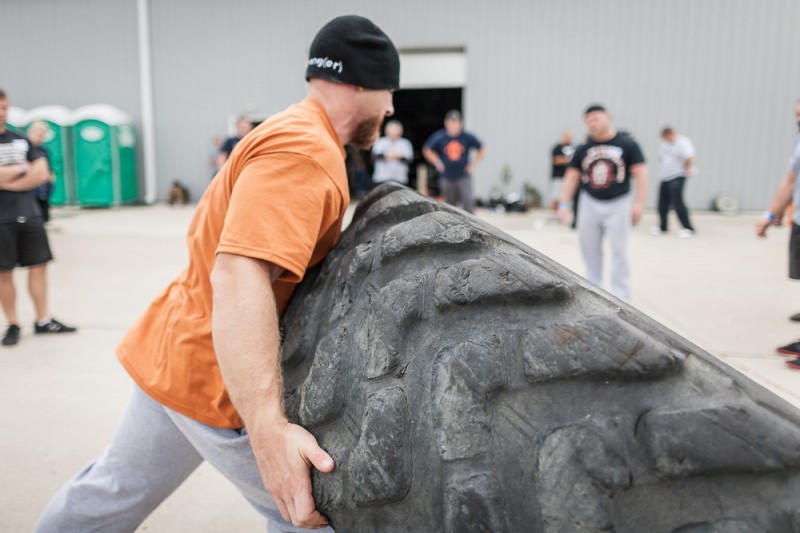
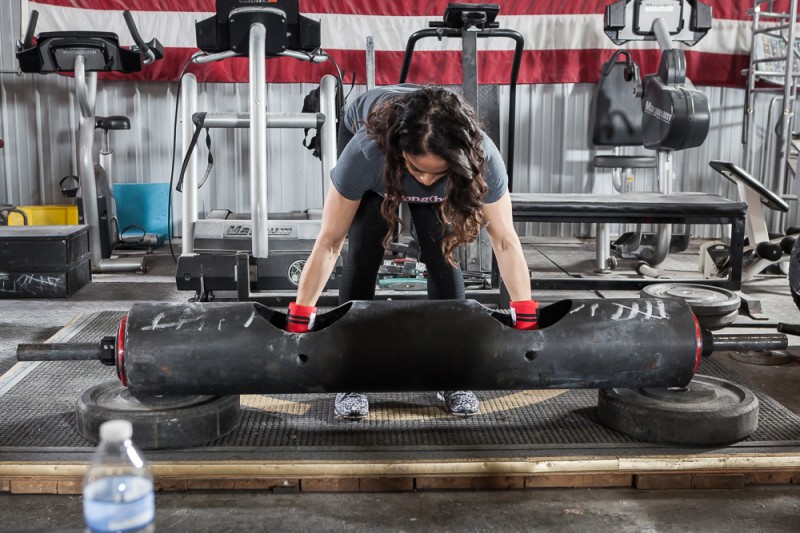
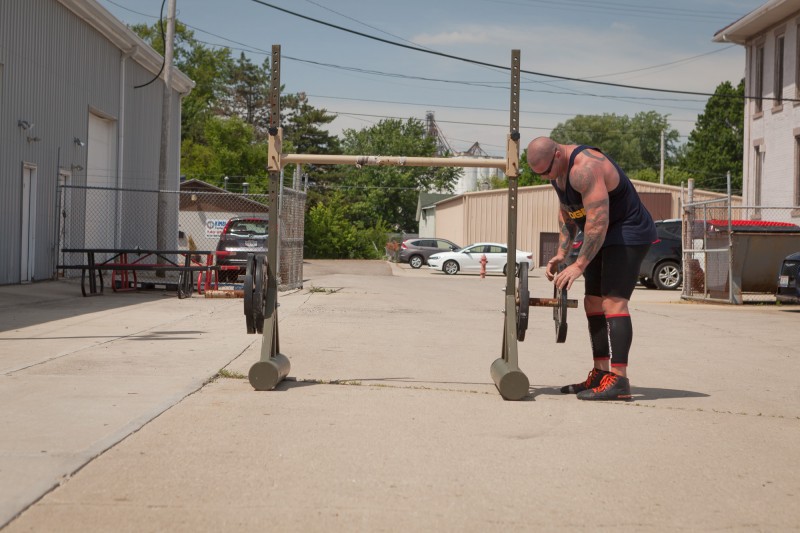
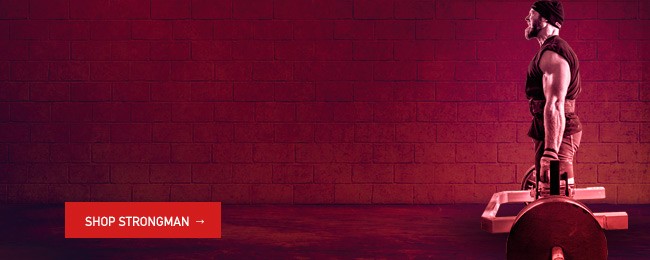
Great article, while I am not a Pro, I did recently qualify for my first Nationals spot next June in Texas for USS. This article has given me a lot of perspective into training and mindset of Strongman. Thank you for the share enjoyed it tremendously.
Brian G